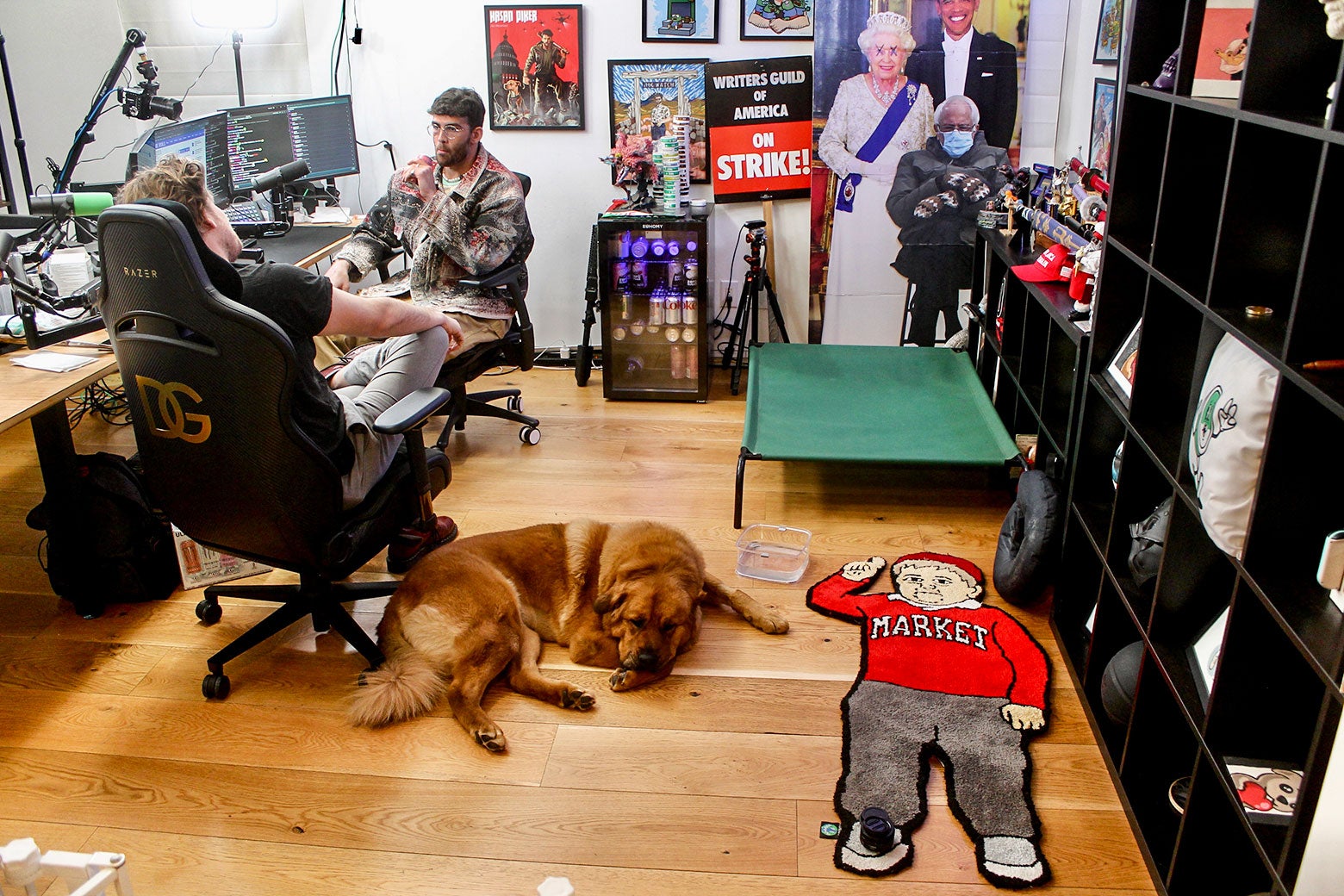It is Jan. 19—the last day of Joe Biden’s presidency, and the eve of a new one no one can quite fathom yet—and Hasan Piker is preparing for the end of the world.
As he almost always is, Piker is live on Twitch. He is at home in West Hollywood, in a secondary bedroom he has turned into a broadcasting booth. The boiling overhead studio lights illuminate the scene. Piker is in the center of the frame, his peripheral vision swallowed up by three chunky computer monitors. Behind him is a clutter of socialist potpourri: Cuban and Gazan flags draped over a minifridge packed with Dr Pepper Zero Sugar, a cardboard cutout of Bernie Sanders blocking sunlight from a window, and a plastic purple skull capped with a furry Soviet ushanka.
There is not much left to be said at the dawn of the second Trump administration, so Piker ends his stream in relative silence, watching highlights from the weekend’s Saturday Night Live. The thousands of viewers in his chat, off to the screen on his right, pump out more messages than anyone could possibly read. A few moments later, Piker bids them good night.
“I’ll be suited up and booted up to cover the Trump inauguration, the first day of the apocalypse,” Piker says. “I love you all. And I’ll see you tomorrow.”
For nearly a decade now, Piker, who streams under the name HasanAbi, has been one of the most famous political commentators in America. If you’re a certain type of mainstream liberal—or a not-very-online moderate or conservative, for that matter—you may not have heard of him. His precise class of celebrity is difficult to describe, but in some respects, he has inherited the role of the agenda-setting television pundit for a generation that ditched the traditional medium long ago, if it ever knew it at all. Piker streams every day, weekends and holidays included. Outside of a few bathroom breaks, he’s typically on-camera, by himself, for eight hours uninterrupted. Tens of thousands, sometimes many more, follow along.
Other channels on Twitch, the Amazon-owned livestreaming platform, tend to focus on Fortnite stunts and other video game feeds. Piker doesn’t play too many video games live. Instead, for the most part, his broadcasts consist of him clicking around the huge number of tabs compressed at the top of his Chrome browser. Piker ping-pongs between them, offering mordant insights on irritating New York Times columns, Elon Musk tweets, and Jesse Watters meltdowns. His style is open-ended and rich with digressions—nothing canned, no artifice—and regardless of what he’s currently roasting, Piker is assertively unscripted. Like many of us, he reacts to the bamboozling deterioration of 21st-century life in real time. Unlike most of us, he does it in front of an enormous audience, every day, with a chronic exasperation perfectly tuned for the moment.
It’s been a winning formula, and Piker seems to conquer a new benchmark every year. In 2020, back when he was still getting his feet wet on the platform, his stream peaked at 230,000 concurrent viewers while he covered Biden’s slim victory over Donald Trump, making him the sixth-most-watched source of election coverage across YouTube and Twitch. Four years later, Piker broke that record when 313,000 people watched him analyze the defeat of Kamala Harris. In a digital news apparatus that is sharply breaking right, Piker is one of the only leftists standing. Of the 10 most watched pundits streaming on Election Day, he outpaced Tucker Carlson and, notably, Trump operative Charlie Kirk, who worked with the campaign to turn out millennial and Gen Z men. Many young male liberals, supposedly an endangered species, have determined that the more tempered and polite avenues of left-leaning media—the nightly slate at MSNBC, the edgeless punch lines of late night—leave them cold. Instead, they have found a common movement with this 33-year-old socialist dicking around on his computer.
In that sense, Piker is in possession of one thing the Democrats desperately want now more than ever. Shortly after the presidential election, when it became clear that the party was hemorrhaging young men to the right, the commentariat bemoaned the absence of a “liberal Joe Rogan”—as in, an alternative-media figure who commands significant clout within a loose contingency of disengaged males and happens to be aligned with an overarching left-of-center project. Who could be a bulwark against an increasingly radicalized Adin Ross, Dave Portnoy, and Theo Von?
Well, here is Piker. He stands 6-foot-4, with a sharp jawline and ripples of coiled muscle. He is conversant in bodybuilding, gaming, anime, professional wrestling, and every other interest that tends to make up the media diet of boys of a certain age. His bulge-and-Calvins thirst traps have started libidinal riots online. According to an unofficial census conducted by his community in 2024, his viewership is about two-thirds men. (Slim majorities are white and hold a college degree, while 30 percent reported that they hadn’t yet lost their virginity.) In the past year, he has welcomed both former Federal Trade Commission Chair Lina Khan and Rep. Alexandria Ocasio-Cortez to the stream. Sanders, 50 years Piker’s senior, passed through a week before the inauguration and thanked him for his role in the “revolution of media.” Even the Pod Save America podcast, staffed by former Obama flacks who’ve long advocated for a more institutional brand of progressivism, hosted Piker and listened patiently while he ripped the party a new one.
All this access has given Piker’s show a sense of beltway authority that it never quite had during the Biden era—evidence of a fledgling effort to make him more central to Democratic messaging. The Democrats, it seems, have found their man.
Just one little problem with that. Piker didn’t endorse Biden at the dawn of the 2024 cycle. Then he didn’t endorse Harris either. Resting on a sheathed samurai sword, near the rear of his streaming setup, is a MAGA hat. Piker wears it on the rare occasions he approves of a Trump decision. On one recent occasion, he slipped it on when the incoming administration had a hand in brokering a ceasefire between Israel and Hamas. Piker is pro–Palestinian liberation, pro-immigrant, pro-trans, pro-choice, and unapologetically himself. Some of this has brought accusations of antisemitism and more, all of which he strongly denies but has lately found Piker in an uncharacteristically defensive posture. His take-no-prisoners approach makes everyone—but especially Democrats—uneasy. For a while, a staffer for Ocasio-Cortez suggested the congresswoman would give me a comment for this article on Piker and Democrats’ future. I followed up repeatedly, only to be told that someone more senior would have to sign off. The comment never came.
As I watched Piker prepare for what was coming in January—an opening salvo from the new Trump administration that aims to redefine the constitution and the country—I saw into a future most Democrats are too afraid to fully consider. And as I’ve watched how the weeks since have played out, it’s become clear how little time there is left to understand Piker’s provocative appeal to a new generation of voters. The cost of ignoring figures like him is becoming all too clear.
Hasan Piker loves America. Or at least he can remember a time when he did. He is the scion of a Turkish family of some renown. Piker’s father, Mehmet Behçet Piker, is one of the founding members of the country’s upstart center-right Future Party, and an uncle, Cenk Uygur, is a veteran pundit best known for his progressive media company the Young Turks. Piker himself was born in New Jersey but moved to Istanbul as a toddler. In his youth, he bristled at the chasteness of the country’s customs—struggling, in his words, with growing up “horny in a repressed culture”—and plotted a return to his once-and-future homeland.
At 18, he got his wish. Piker enrolled at the notoriously debauched University of Miami and chased his very own American dream. His education came second to intoxicating stateside indulgences: A few weeks into his college career, Piker started working as a nightclub promoter—one of his first jobs in the U.S.—hustling tourists into the strobing bacchanals of the city’s nightlife district.
“Hasan knew exactly what was going on. He could get 100 to a club as a freshman,” Uygur told me. “Wherever he went, he instantly became the coolest person on campus.”
Like so many other millennials, Piker experienced his first brush with left-wing politics via The Daily Show and other Bush-era satire, but he does not exactly remember himself as civically engaged. “I was a dumb college kid,” Piker said. “I was just happy to be in America.” He didn’t declare a major at Miami, but after transferring to Rutgers at his parents’ behest, Piker secured degrees in political science and communications in 2013. Nonetheless, Uygur remembers being “surprised” when his nephew inquired about a job at the Young Turks, a publication that had already become associated with a spiky, confrontational brand of populism a few shades outside the liberal mainstream. Uygur put Piker in ad sales, about as far removed from the partisan edges of the company as possible, and he hated the job. “You just have to sit there cold-calling and being nice to people,” Piker said. “It was a horrible experience.”
In 2016 Piker managed to secure dominion over the Young Turks’ Facebook page, which was technically a demotion from his position in the advertising department. (He took a pay cut.) He was tasked with cutting together the company’s TV broadcasts into bite-size, BuzzFeed-style clips designed to juice virality. Piker attended to those duties while simultaneously breaking ground on a rogue media brand of his own. He commandeered an empty supply closet in the Young Turks office and converted it into a makeshift studio. He hung up a green screen and, after determining that he didn’t yet have the broadcasting chops to rant on command, started writing scripts. The resulting videos melded perfectly with the Young Turks brand. Piker was scrappy, profane, horrified by Republicans, and annoyed at Democrats—auguring a burgeoning left–liberal schism that continues to color American politics today. Piker began surreptitiously interlacing those uploads with the rest of the company’s Facebook library. The first episode featured a noticeably stiff Piker standing in front of the camera, wearing a lavender shirt buttoned up to his collar. It was titled “5 Things You Didn’t Know About Bernie Sanders.”
Piker called this series The Breakdown, and it became a surprise hit on Facebook, with some videos scoring more than 100 million views. The success was a testament to Piker’s content instincts. He was keyed in on a generational distaste for Hillary Clinton’s short-lived Democratic Party, and he also knew how to synthesize the various tendrils of social media during the shock of the initial Trump confusion. (One of his most frequent targets was Tomi Lahren, an early MAGA star who was drafting in a similar wave of engagement on the other end of the political spectrum.) The Breakdown embedded itself in the bones of the Facebook algorithm, and Piker leveraged the virality to promote his own Instagram, creating a raft of fans outside official Young Turks channels.
The first time Piker ever felt famous was at a Buffalo Exchange store, when he overheard two people talking about a particularly spicy episode of the show. “I was like, Oh my God,” he told me. “People are really watching this.”
The attention clarified something else about Piker. He was hot—classically handsome in a way that became fundamental to his mystique. Piker was a chubby kid in high school and continued to struggle with his weight through college, but after pledging himself to the gym in his early 20s, his body rewarded him. Piker shed 85 pounds. His shoulders thickened, his waist cinched up, and his striking visage conquered a certain corner of the liberal internet. BuzzFeed compiled a slideshow of Piker’s saucy Instagram selfies, bequeathing him the nickname Woke Bae. Piker pinned the article to the top of his Twitter page with pride. He seemed to inspire an endangered masculine fantasy in the fragile months of Trump’s first ascent: a hunky progressive, proclaiming the virtues of the “Women’s March,” standing against alpha-wave alt-right figures. One of the photos included in the BuzzFeed article featured Piker, with a doe-eyed model stare, dressed in a gray hoodie that reads, “I Met God, She’s Black.”
The glow-up provided him a blueprint for everything he’s achieved since. If Piker could become yoked, then anything was possible. “It was life-changing in the sense that it was a task I set for myself that I never was able to accomplish my whole life. It gave me so much confidence, not necessarily about how I look, but in my ability to overcome trials,” he said. “I’m not necessarily the most skilled person at anything. I don’t have a ton of natural talent. But I am super talented at working very hard.”
Piker was already streaming on Twitch while he was working at the Young Turks, but in 2020, he left the company to pursue the venture full time. The breakup was amicable. “I didn’t try to talk him out of it,” Uygur said. “If I wasn’t sure he was going to be successful, I wouldn’t let him out on his own.”

Piker regards his Twitch broadcasts as a natural extension of the work he did on Facebook. Online leftism, especially since Biden secured the Democratic nomination in 2020, has earned a reputation for being dour and nihilistic, eager to cheer on the pratfalls of the Democratic Party. But since his move four years ago, Piker has shown a willingness to be a team player. He has hosted voter registration drives with Ocasio-Cortez and Ilhan Omar, and when he filled out his 2024 ballot live on air, he reluctantly pulled the lever for Adam Schiff, whom he referred to as “Adam Shit,” owing to his staunch pro-Israel stance.
Felix Biederman, a friend of Piker’s and one of the hosts of the notoriously ribald leftist podcast Chapo Trap House, compared his influence to something like the Daily Show’s cultural apex—which, tellingly, occurred when the Democratic Party was adrift following Bush’s defeat of Kerry in 2004. Is Piker a tad vulgar? Does he engage in some heterodox thinking? Sure, but as Biederman puts it, that presents “comparatively little risk to a pretty good reward.”
Piker’s house is oddly quiet when he’s not streaming. He’s made the place into a palatial bachelor pad, all honoring his unique strain of bro-friendly progressivism. Bookcases pack Naruto manga next to revolutionary scholarship. An oil painting of Bernie Sanders, depicted as a leather-clad punk singer, gazes toward the mile-wide kitchen island. The refrigerator brims with protein shakes; Zyn canisters, in every flavor, are stacked in a pyramid. Most revealing of all might be the sticker plastered on the oven. It reads “I Love Being Mad on the Internet.”
In 2021 he purchased this house—the one that he and I are currently sitting in—for $2.7 million. It is undeniably lavish: five bedrooms and five and a half bathrooms, with high ceilings, polished countertops, hardwood floors, and a stately patio on the bank of a lap pool. Piker has made no effort to conceal the good life while I’m around. I spot, on top of a pile of torn-open envelopes splayed out in the kitchen, a letter from Porsche. There’s a parts recall for his car.
About 50,000 people pay a monthly fee of $5 to subscribe to Piker’s Twitch channel, allowing them to tune into Piker’s stream ad-free. Extrapolate those numbers, as NBC did last September, and Piker is estimated to be raking in more than $2 million annually—a significant upgrade from the $65,000 a year he was making at his uncle’s company. He has taken full advantage of that sizable bounty, which has ruffled more than a few feathers on both sides of the aisle.
Conservative media loves to fetishize the material discrepancies of progressivism, so an avowed socialist buying up prime California real estate was manna from heaven. When news broke of Piker’s new abode, Fox News opined about the “hypocrisy” of a leftist living in upper-class luxury, while Ben Shapiro took Piker to task on YouTube. “$2.7 million is a lot of money. I don’t see you handing that out to all of the immiserated workers in the Marxist social construct,” he said. “You can get yourself a tiny little shack and live yourself the Henry David Thoreau lifestyle for probably $30,000 somewhere.”
Piker wasn’t fazed. Months later, he posted a video of himself at a car dealership, purchasing that $200,000 Porsche. “Wait till they find out that I’m never going to fucking drive it!” he said, as a fresh wave of outraged MAGA acolytes filled his mentions. Does a socialist reveling in his abundance expose a political contradiction? Perhaps. But Piker has also correctly identified that in 2025, when Trump of the Manhattan penthouse can be twice enshrined as a working-class hero, those contradictions are not nearly as relevant as they used to be. Piker is a young man responding to his enormous windfall in a way that is extremely relatable to other young men. That, more than anything else, has proved to be invaluable to his cause.
“Hasan lives a super aspirational life. A lot of other men on the left don’t have that same aspirational aesthetic to them,” Taylor Lorenz, an author and journalist who covers internet culture, told me. “There is a generation of young people who want to consume media from someone they look up to. They want to improve their lives. They want to imagine a better world for themselves. And a lot of people are selling that better future in a package that is hateful. I think that Hasan sells them on a progressive future.”
Piker is happy to meet MAGA men where they are. “I give a lot of leeway to people for having somewhat bigoted views,” he said, without hesitation. It’s a radically different strategy from liberal orthodoxy that, for years, balked at the idea of courting people who were too retrograde, too brain-rotted by conspiracy, simply too far gone to be marbled into a larger political project. It recalls an incident in early 2020 when Sanders was excoriated for accepting the endorsement of Rogan, someone who, indeed, has shown that he’s held those “bigoted views” Piker speaks of. What did that liberal purity earn? Voters under 30 dramatically swung to the right in November’s election. Young men in particular have been conquered by the Republican Party—56 percent of them voted for Trump in 2024, compared with just 41 percent in 2020. Piker argues for a different approach.

Candice Lim
A few weeks before we met, Piker spent a day filming content with a fitness influencer named Bradley Martyn, who has 4.2 million followers on Instagram and who voted for Trump in November. Piker talked about housing justice and the vagaries of private health care on Martyn’s podcast. Then the two of them crushed 300-pound dead lifts at the gym.
“I think that’s something a lot of political commentators lack in general,” Piker said. “They’re not real human beings. What I do requires a tremendous amount of charitability from the audience. I speak in opposition on a lot of issues that people take for granted. Issues that people have been socially conditioned to believe are the norm, and that the alternative is scary and dangerous. So people have to be open to hearing me out. It might make them more open-minded to my commentary and the way I see the world.”
Piker has reason to believe that this is working. On the r/Hasan_Piker subreddit, home to 151,000 “Marxist Chads,” there is a thread titled “How did you come across Hasan?” Some chime in to say they fell in love with his videos for the Young Turks or via a shoutout from AOC. But scores more credit Piker for either their radicalization or their de-radicalization. An avowed centrist recalls being fearful of the “stigma of socialism” until he watched a video of a guy who was “young, sexy, and strong” debunking a right-wing talking point on systemic racism. They’ve swung left ever since. Another poster recalls going down a much darker path. They were watching Shapiro and Steven Crowder and found themselves sympathizing with white nationalist rhetoric. Over time, though, the poster began tuning into some of Piker’s nonpolitical videos. They found his personality charming, and it slowly drew them into the movement.
“That lead me to where I am today where Im a democratic socialist,” they wrote. “Im glad I started watching him before I could vote.”
With the Democrats so thoroughly out of answers—the party’s approval ratings are hovering in the low 30s, after ceding so much digital ground to the conservative movement—Piker offers an alternative. The only question left is if the establishment can accept the type of coalition Piker wants to create.
Uygur, for one, has some doubts. “I know exactly how this movie is going to end,” he said. “There’s a zero percent chance Hasan is going to become a corporatist. And there’s a zero percent chance the Democratic Party as it’s currently composed will not be corporatist. So they will have an inconvenient marriage for a while, and then they’ll fall out of love with him. At the end of the day, he’s not going to give the message that they want.”
Some signs suggest otherwise. At his house, Piker told me: “Virtually everyone running for head of the DNC has reached out to me, but I haven’t had time to interview them.” We were sitting in his studio while Kaya, his enormous Tibetan mastiff, weaved through our legs.
“Well, except for Martin O’Malley, I think,” he said. “Or whichever one is the most corporate.” (Ken Martin eventually won the job.)
But he, too, had his doubts about how deep his influence can get in the current environment. “I’m not changing. That’s the thing. I’m not above admitting when politicians do good things, but that doesn’t mean I’m going to be a Democratic Party operative. That’s just not how I operate. Some people play catch-up with the Democratic Party and defend everything the Democrats do on principle, because they see that as a way to improve their social status. They’re just careerists. But I have a real political opinion, a real way I see the world. And I genuinely believe that it improves the living standards of everyday Americans. I think that’s not only good policy but also good politics.
“If a day comes where I’m side by side with the Democratic Party,” Piker added, “that means the Democratic Party has changed its ways.”
This was the day before it would become clear just how badly Democrats were prepared for what was to come.
Last year, Piker briefly considered quitting his streaming career. He thought about going back to school, earning a Ph.D., and never again worrying about the scrutiny on his life or his politics. Piker began to feel this way after Oct. 7, an event that forced him, and every other pundit, to witness every day the escalating horrors of the war between Israel and Hamas. Piker was a steadfast pro-Palestinian voice, and during the war, he demonstrated sympathy for some of Israel’s assailants.
This often put him in reedy territory. In one memorable instance, Piker interviewed an alleged Houthi sympathizer who went viral on TikTok for his uncanny resemblance to Timothée Chalamet. Piker asked him if he watched the long-running anime One Piece. The teenager nodded enthusiastically.
The incident helped catapult Piker to the forefront of the American anti-Zionist movement. Last November, the New York congressman and Israel hawk Ritchie Torres wrote an open letter, titled “Hasan Piker Is Dangerous,” addressed to Twitch CEO Dan Clancy. Torres called Piker the “poster child” of a surge in antisemitism since Oct. 7, contending that the streamer holds a deep-seated animus toward Jews. “Why is Twitch so untroubled by Hasan Piker’s troubling Jew-hatred?” he wrote. “If the KKK or the Third Reich were a social media platform, it would be Twitch.”
Piker was used to the routine drama of internet fame, but censure from an elected official was a different beast. Fox News, in a story published after the letter, outlined a lengthy taxonomy of Piker’s takes on Gaza. Among them: that sexual violence that occurred on Oct. 7 didn’t change “the dynamic” of the conflict for him; that Hamas was a “lesser evil” than the Israeli military. Meanwhile, Jonathan Greenblatt, head of the Anti-Defamation League, took to X and claimed that Piker’s “toxic screeds against the Jewish state normalize bigotry and launder terror,” imploring media companies to deplatform him.

The controversy has started to affect Twitch’s bottom line. As Bloomberg reported in December, a smattering of online forums—all associated with the Zionist streamer and infamous internet troll Steven “Destiny” Bonnell, who has gotten into hot water for his usage of various slurs—have canvassed companies to suspend their ad campaigns with Twitch. So far, JP Morgan, AT&T, and Dunkin’ have acquiesced.
So, for the first time in his career, Piker is under siege. He maintains that the quotes circulated by Fox News were cherry-picked from the protracted monologues of his stream. As someone who has sampled the entirety of these broadcasts, which are all far too self-reflexive to ever be reduced to a single talking point, I think that assertion is largely true. Still, for as much as he told me it’s “not great” to be roped in with racists and Nazis by the Israel lobby, Piker does find himself wondering if all of this fracas might signal a greater shift. If his presence is being taken as a threat, then perhaps the right people are feeling the heat.
“There’s no way Jonathan Greenblatt actually believes I’m an antisemitic person. I think I’m more dangerous,” said Piker, who, indeed, has called out anti-Jewish conspiracies on numerous occasions. “If your project is to constantly propagandize a pro-Israel position, someone like myself who is openly against antisemitism and works actively to educate people on dogwhistles and also happens to be anti-apartheid is more dangerous. Because I’m the one who’s going to be radicalizing their nieces and nephews, and that is what’s terrifying.” (Greenblatt has in fact only stepped up the antisemitism accusations in 2025.)
For now, then, this is all Piker wants to do. Asked if he has ever considered running for office—testing his influence against the nation as a whole—he demurs. He doesn’t think he’s cut out for the scrutiny of national politics, and he feels as if he is most useful to his cause in front of a PC.
In fact, Piker often speaks about his dream of becoming fully “regime-pilled.” If the Democratic Party did bend to his ideology, he’d happily morph into a cheerleading propaganda machine. Not a liberal Joe Rogan, but a leftist Joe Rogan. When I posed the same question to Biederman, he wasn’t so sure. Could he imagine a President Piker? “The only logical conclusion, when you acknowledge the immovability of the Democratic Party, is that there has to be a party that replaces it,” he said. “I don’t really see him ever wanting to do that, but I don’t know. Life will always surprise you.”
It’s a point that echoes something Piker said earlier about his unwillingness to compromise with the Democrats. Maybe, if his plan works, he won’t have to. A common refrain among leftists is that the liberal coalition, in its ossified state, can evolve only if it is sufficiently defeated. How does one purge its conservative elements? Or expunge its corporate donors? Or concoct a more progressive foreign policy? Through opposition, through primaries, through a categorical refusal to accommodate half measures. It is a conception that previously isolated someone like Piker to the political Arctic, disqualified from any real influence. But with the party in free fall—and a growing understanding that the old rules simply don’t work anymore—his dissidence has been given a rare moment to shine.
“Do I think that there are people that have basically grown up watching me and then got into politics and started getting lower-level campaign positions? Absolutely,” he said. “Will they be chewed up and spit out by the machine or become the same feckless institutionalists later down the line when they actually do get some semblance of power? Possibly.
“That’s the reason I want to grow my community,” he added. “So we can force the Democrats to do the right thing.”
The following morning is Jan. 20. The day has arrived. Piker returns to his desk in a button-down stitched with the Texas Lone Star to take in the dawn of the second Trump administration.
Piker is in a sour mood. He grows steadily more agitated as the new president repeals LGBTQ+ protections and junks America’s participation in the Paris Agreement. He can hardly believe his eyes when Elon Musk makes a conspicuously Nazi-looking gesture toward a crowd of MAGA partisans. He watches Hulk Hogan rip off his blazer, revealing a shirt that reads “Trumpamania.” Piker waxes poetic on American decline, labor solidarity, and the wave of oligarchic Christian fascism that seems to be gobbling up every Western democracy.
“America sucks. And as a nation that sucks, we’re going to have a president that sucks,” he growled, visibly more despondent than usual. “Democrats sold the country off. We’re an embarrassing country. And I think that even Trump supporters are somewhat aware of the demise.”
In the weeks that follow, once it becomes clear that a second Trump administration is poised to be just as destructive as advertised, Democrats are once again mired in a communications crisis. With Musk slashing the administrative state to ribbons, the specter of destabilizing tariffs, and a renewed assault on the rights of undocumented immigrants, where was the opposition? It was another stark reminder of just how overmatched the party appears to be, stricken by an enfeebling inability to summon the venom—the anger—its base is feeling.
Piker has never missed an opportunity to express his wrath. The day after the inauguration, he flew to Japan with plans of waking up in the middle of the night to broadcast on Twitch during his usual West Coast time slot.
“If you recognize that Republicans are devastating to the country, to the globe, to the lives of Americans and the lives of your neighbors, then you have to do everything in your power to fight back,” he said on a recent stream, his face softened by the milky lens of a webcam. Piker was analyzing Trump’s order to transform Guantánamo Bay into a detention camp for migrants, an action he believes is the first step toward far more heinous anti-immigration measures. It’s a classic Piker fixation, the sort of thing that innervates his fury for the inert center of the Democratic Party. To him, ceding any policy territory to the conservative elements of your coalition is death. It only provides cover for the Republicans to push further, to savor more cruelty, to inflict more pain.
“This is why I kept criticizing the Democrats during the election cycle. This is why I kept losing my mind,” Piker said. “I was like, ‘Dude, I don’t want Trump to win, and it seems like you guys want him to win, or at least don’t care enough to do what is necessary to stop him from winning.’ And here we are.”
There are more days like this coming for Piker. More executive orders, more electoral defeats, more tepid reactions from the Democrats that he finds anemic or otherwise annoying. The terrible scale of this American era comes rushing at full blast through three computer monitors—on the other end is Piker, and 30,000 people who want to believe in a better future.
“You have nobody to protect you but yourselves and your neighbors,” Piker said at the conclusion of that inauguration stream. “Who knows what will happen tomorrow, but I will be there to cover it. As always.”















